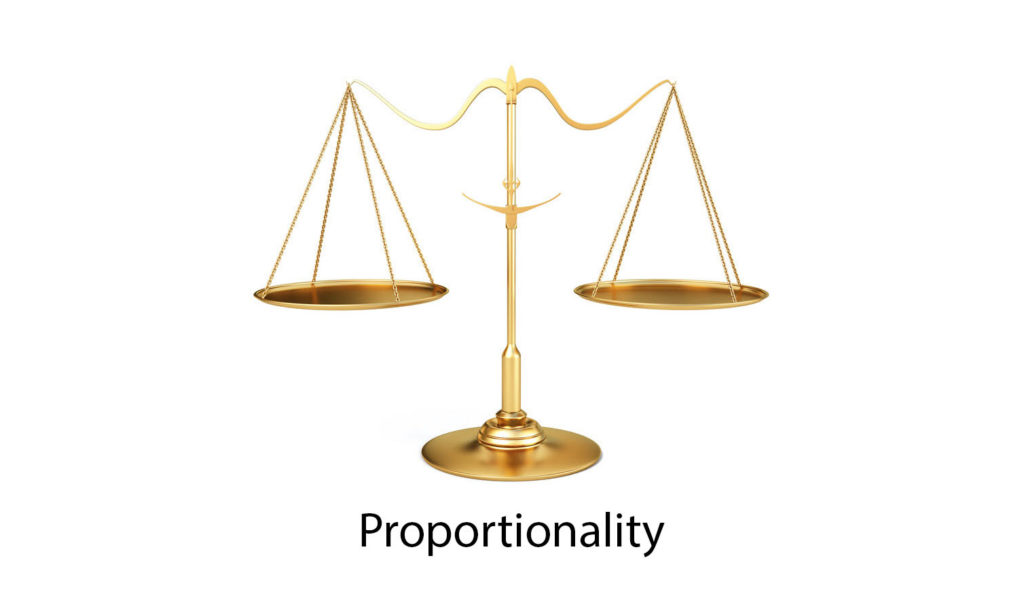Highlight 35/2023 – Proportionality principle in the EU Charter of Fundamental rights: A benefit to human rights?
Ruzanna Abrahamyan, 29 November 2023

Not all human rights principles enjoy the same level of protection. Instead, they can have different legal characteristics – absolute or non-absolute. The non-absolute character of these rights means that in the context of a democratic society where they interface with other values, it is permitted to restrict these rights by balancing their enjoyment against the pursuit of a legitimate aim.
Proportionality is a doctrinal tool for the resolution of conflicts between a right and a competing right or interest, at the core of which is the balancing stage where the right is balanced against the competing right or interest. The sub-principles of proportionality are: the proper purpose pursued, the adequacy, the necessity and the proportionality stricto sensu.
Proportionality is a general review in EU law as well that is applicable to test the legality both of EU action, and of member state action when the latter falls within the ambit of the Treaty. This principle has been developed as one of the general principles of the Community (European) law due to the Court of Justice of the European Union (CJEU) rulings. From the 1950s, the CJEU started to point to the proportionality. In a ground-breaking judgment, CJEU stated that the freedom of an individual’s action should not be limited by the state in a wider range than is required by public interest. By such an expression, the Court showed a new perspective which involves the interests of individuals. In this regard, special attention should be paid to the FORMA case in which the Court offered a definition of proportionality.
According to the Charter of fundamental rights of the European Union, interferences with most of the Charter rights are acceptable as long as a reasonable justification can be provided. For example, Article 52 EU Charter makes it clear that any permissible derogations by Member States from EU law obligations as set out in the Charter, are contingent on proportionality. Some provisions contain express justification clauses while others do not. But in many cases the CJEU has read an implicit possibility for justification into these Articles.
Despite the fact that the proportionality principle attracts the attention of constitutional rights theorists, some opposition to the principle has begun to form.
Controversy surrounds the issues of whether Member States could invoke proportionality to derogate from the absolute rights in the Charter, whether the proportionality doctrine has indeed a profound significance in resolving human rights disputes, taking into consideration the high level of judicial discretion, absence of a common metric in the balancing procedure, certain margin of appreciation to the Member States, etc…
As for the first issue it is worth noting that although the Member States could invoke proportionality to derogate from the rights guaranteed in the Charter, since Article 52 applies to all rights, there are limits in the light of dignity and the rule of law (EU law principles). Nonetheless, the explanatory memorandum on the Charter confirms that these exceptions are based upon the Court’s well-established case law that restrictions may be imposed on the exercise of fundamental rights. Indeed, the Charter refers to the ECHR in Article 52(3) in pointing out that the ECHR is always the minimum standard of protection.
As regards the question of judicial discretion, indeed, proportionality should provide judges the required flexibility so as to balance the competing interests on a case-by-case basis. Meanwhile, the wide application of proportionality in cases concerning human rights conflicts should not neglect the intrinsic nature of human rights and result in arbitrary decisions.
In relation to the margin of appreciation, CJEU has shown a greater tendency to accept value diversity and to leave a certain margin of appreciation to the Member States in cases dealing with national constitutional traditions, but principle of conferral should be applied in such a way to provide rational balance between the principle of subsidiarity and correct application of the Charter.
To sum up, the notion of proportionality is definitely a golden rule in EU law and is one of the most crucial general principles, one which is used both as a sword and as a shield, usually in the context of to what degree the Member States could derogate from their EU law obligations. It is an expression of the right to justification and could be connected to the idea of justice (at least in the legal sense) and the bigger issue of good governance in case of correct implementation.
Ruzanna Abrahamyan, Highlight 35/2023 – Proportionality principle in the EU Charter of Fundamental rights: A benefit to human rights?, 29 November 2023, available at www.meig.ch
The views expressed in the MEIG Highlights are personal to the authors and neither reflect the positions of the MEIG Programme nor those of the University of Geneva.
